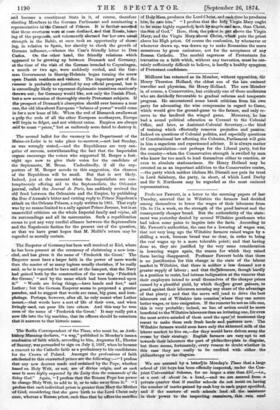Profellor Fawcett, in a letter to the morning papers of
last Tuesday, asserted that in Wiltshire the farmers had decided among themselves to lower the wages of their labourers from 12s. to lls, a week, on the strength of the good harvest and the consequently cheaper bread. But the authenticity of the state- ment was yesterday denied by several Wiltshire gentlemen who had taken some pains to inquire into the facts. According to Mr. Fawcett's authorities, the case for a lowering of wages was, that not very long ago the Wiltshire farmers raised wages by a shilling a week, because bread was so dear, in order to bring- the real wages up to a more tolerable point; and that having done so, they are justified by the very same consideration in lowering wages again, the reason for which they raised them having disappeared. Professor Fawcett holds that there is no justification for this change in the state of the labour market in Wiltshire, that there is neither a less demand nor a greater supply of labour ; and that the:labourers, though hardly in a position to resist, feel intense indignation at the rumour that their employers intend to avail themselves of the cheaper prices caused by a plentiful yield, by which theylare great gainers, to guard against their labourers securing any share of the advantage of that plenty ; and that the move will tend to drive the best labourers out of Wiltshire into counties_ where they can secure better wages, or into emigration. If the rumour be not an idle one, this is very probable ; indeed, no line of action could be more beneficial to the Wiltshire labourers than an irritating one, for even the most active-minded of them need the spui'of treatment they resent to make them seek fresh lands and pastures new. The Wiltshire farmers would soon have only the skimmed milk of the labour market to live on,—for they would have driven away the cream by their strategy. English farmers are very apt to act towards their labourers the part of philanthropists in disguise, but there seems, fortunately, every reason to doubt whether in this case they are really to be credited with either the philanthropy or the disguise.






























 Previous page
Previous page